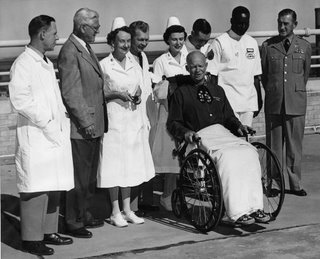
The Jazz Messengers, Prince Albert.
Jazz is supposed to be pure democracy in music--at least, that's how it's described whenever Wynton Marsalis gets in front of a camera--but it rarely works out that way. There are arrangements to write, and songwriting credits to haggle over, and the hapless task of organizing musicians, who are no strangers to ego and sloth, generally requires someone to crack the whip. No one did the latter better than Miles Davis, who, even in 1949, was known as the guy who called the shots and signed the checks--but you would never think of a Davis group as a pure "cooperative" either.
The Jazz Messengers, Art Blakey's dream of a jazz cooperative, evolved into a similar type of vehicle by the late 1950s--a band with a rotating cast dominated by the genial Blakey as bandleader. But in the Messengers' first years, the band was very much a contest of equals--Horace Silver on piano, the trumpeter Kenny Dorham, Hank Mobley on tenor sax, Doug Watkins on bass and Blakey on drums.
So hear democracy in action--Dorham's "Prince Albert" is his variation on the chords of Jerome Kern's "All the Things You Are" (known by music students as "All the Changes There Are"). Dorham begins the solos, all air and confidence (he even throws in a bar or two of "Camptown Races"); Mobley follows with a mixture of power and finesse. Blakey adjudicates throughout, challenging the players by shaking up the time.
Recorded on November 23, 1955, at the Cafe Bohemia in New York, a short-lived but legendary jazz club in Greenwich Village. Find "Prince Albert" here. You can visit the site of the former Cafe Bohemia at 15 Barrow St., in New York, but be warned--it has been reincarnated as the Barrow Street Alehouse, a bar often frequented by drunk, unpleasant college kids.
Buck Owens 1929-2006

It's been a tough year already, eh? We were going to meet Buck in a couple months as part of this survey, but sadly, it's time for a brief tribute to one of country's music's last legends.
Buck Owens, Waitin' in Your Welfare Line.
Buck Owens, It Takes People Like You (To Make People Like Me).
The first, from 1966, has one of Buck's funniest lyrics, though there's a tenderness to his voice that takes the song beyond its limits. The second, from 1967, is a sweet, straightforward thank-you note to his fans.
More at Big Rock and There's Always Someone Cooler.
No comments:
Post a Comment